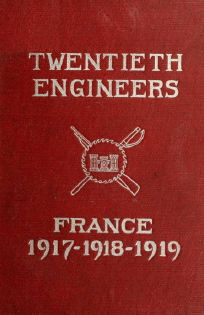


FOREWORD
When America entered the war in 1917, one of the first demands of the Commander-in-Chief was for a regiment of forestry engineers. If an army of the size contemplated was to be put at the front, docks must be built; railroads laid; barracks, warehouses, hospitals, bakeries, refrigerator plants, and power plants provided; and trench timbers, dug-outs, and barb-wire stakes furnished. The basic factor in all these necessities was lumber and the Twentieth Engineers, detailed to this task, more than met their tremendous responsibility.

Captain Howard Y. Williams
Regimental Chaplain
It meant work: hard, monotonous, and unrelenting, but never did men respond more nobly. From these first days in the Fall of 1917 when I saw men hitched to wagons and pulling like horses because we had none; through those terrible spring days of 1918 when the Germans were driving on toward Paris and these men scattered from the Pyrenees to the Argonne toiled day and night to make possible our defense; down through the armistice until the last man came home, in all my experience across the seas I never saw more faithful and conscientious effort. Brave deeds abounded in France but equal in spirit to any of them was the persistent devotion to his task, so vitally essential but lacking in personal glory, of many a man in this largest regiment in history.
It was my great privilege to serve men of many regiments, but in all my service never did I find an organization of better personnel, or men who responded more quickly to high ideals and unselfish service. The story of these men, their devotion, their sacrifice, and their loyalty will be related as long as the history of American accomplishments in the World War shall be recorded.